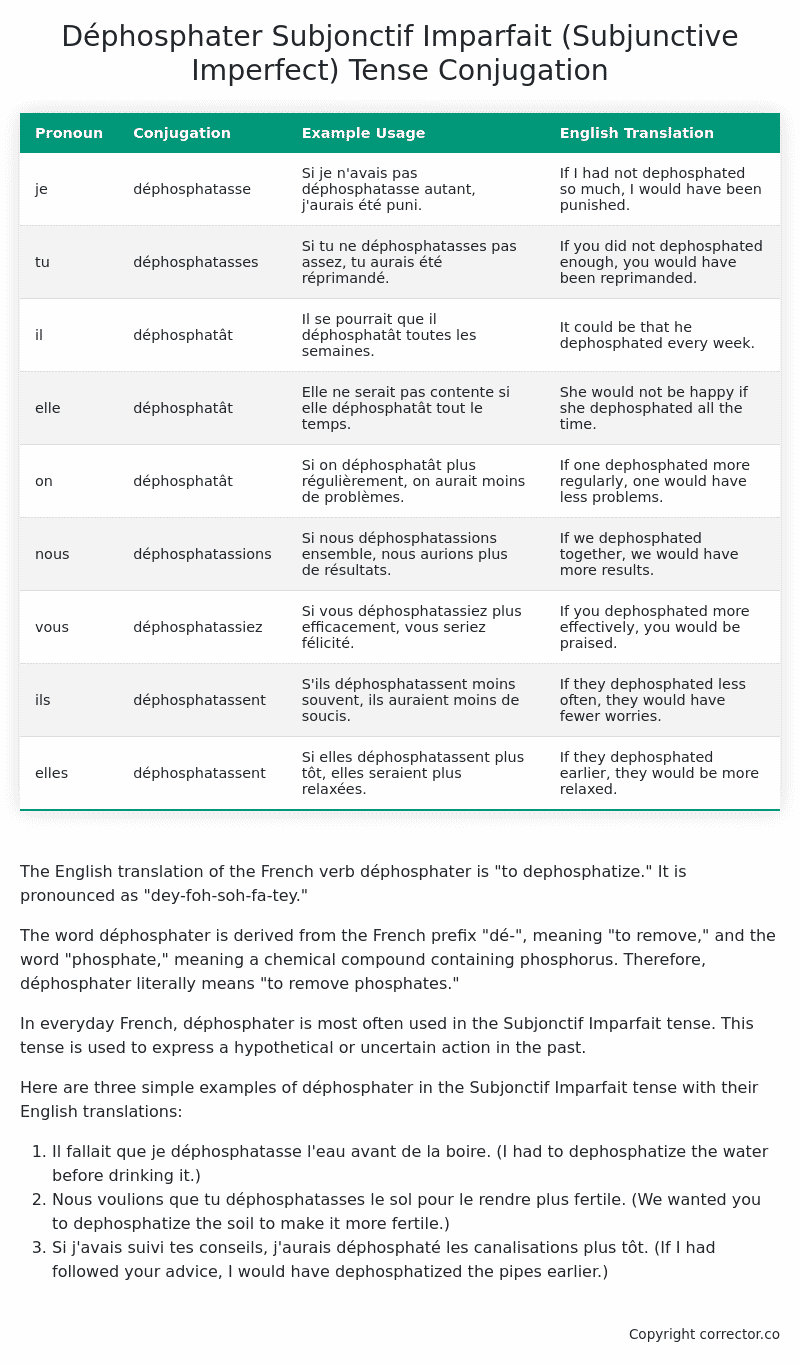Subjonctif Imparfait (Subjunctive Imperfect) Tense Conjugation of the French Verb déphosphater
Introduction to the verb déphosphater
The English translation of the French verb déphosphater is “to dephosphatize.” It is pronounced as “dey-foh-soh-fa-tey.”
The word déphosphater is derived from the French prefix “dé-“, meaning “to remove,” and the word “phosphate,” meaning a chemical compound containing phosphorus. Therefore, déphosphater literally means “to remove phosphates.”
In everyday French, déphosphater is most often used in the Subjonctif Imparfait tense. This tense is used to express a hypothetical or uncertain action in the past.
Here are three simple examples of déphosphater in the Subjonctif Imparfait tense with their English translations:
- Il fallait que je déphosphatasse l’eau avant de la boire. (I had to dephosphatize the water before drinking it.)
- Nous voulions que tu déphosphatasses le sol pour le rendre plus fertile. (We wanted you to dephosphatize the soil to make it more fertile.)
- Si j’avais suivi tes conseils, j’aurais déphosphaté les canalisations plus tôt. (If I had followed your advice, I would have dephosphatized the pipes earlier.)
Table of the Subjonctif Imparfait (Subjunctive Imperfect) Tense Conjugation of déphosphater
| Pronoun | Conjugation | Example Usage | English Translation |
|---|---|---|---|
| je | déphosphatasse | Si je n’avais pas déphosphatasse autant, j’aurais été puni. | If I had not dephosphated so much, I would have been punished. |
| tu | déphosphatasses | Si tu ne déphosphatasses pas assez, tu aurais été réprimandé. | If you did not dephosphated enough, you would have been reprimanded. |
| il | déphosphatât | Il se pourrait que il déphosphatât toutes les semaines. | It could be that he dephosphated every week. |
| elle | déphosphatât | Elle ne serait pas contente si elle déphosphatât tout le temps. | She would not be happy if she dephosphated all the time. |
| on | déphosphatât | Si on déphosphatât plus régulièrement, on aurait moins de problèmes. | If one dephosphated more regularly, one would have less problems. |
| nous | déphosphatassions | Si nous déphosphatassions ensemble, nous aurions plus de résultats. | If we dephosphated together, we would have more results. |
| vous | déphosphatassiez | Si vous déphosphatassiez plus efficacement, vous seriez félicité. | If you dephosphated more effectively, you would be praised. |
| ils | déphosphatassent | S’ils déphosphatassent moins souvent, ils auraient moins de soucis. | If they dephosphated less often, they would have fewer worries. |
| elles | déphosphatassent | Si elles déphosphatassent plus tôt, elles seraient plus relaxées. | If they dephosphated earlier, they would be more relaxed. |
Other Conjugations for Déphosphater.
Le Present (Present Tense) Conjugation of the French Verb déphosphater
Imparfait (Imperfect) Tense Conjugation of the French Verb déphosphater
Passé Simple (Simple Past) Tense Conjugation of the French Verb déphosphater
Passé Composé (Present Perfect) Tense Conjugation of the French Verb déphosphater
Futur Simple (Simple Future) Tense Conjugation of the French Verb déphosphater
Futur Proche (Near Future) Tense Conjugation of the French Verb déphosphater
Plus-que-parfait (Pluperfect) Tense Conjugation of the French Verb déphosphater
Passé Antérieur (Past Anterior) Tense Conjugation of the French Verb déphosphater
Futur Antérieur (Future Anterior) Tense Conjugation of the French Verb déphosphater
Subjonctif Présent (Subjunctive Present) Tense Conjugation of the French Verb déphosphater
Subjonctif Passé (Subjunctive Past) Tense Conjugation of the French Verb déphosphater
Subjonctif Imparfait (Subjunctive Imperfect) Tense Conjugation of the French Verb déphosphater (this article)
Conditionnel Présent (Conditional Present) Tense Conjugation of the French Verb déphosphater
Conditionnel Passé (Conditional Past) Tense Conjugation of the French Verb déphosphater
L’impératif Présent (Imperative Present) Tense Conjugation of the French Verb déphosphater
L’infinitif Présent (Infinitive Present) Tense Conjugation of the French Verb déphosphater
Struggling with French verbs or the language in general? Why not use our free French Grammar Checker – no registration required!
Get a FREE Download Study Sheet of this Conjugation 🔥
Simply right click the image below, click “save image” and get your free reference for the déphosphater Subjonctif Imparfait tense conjugation!

Déphosphater – About the French Subjonctif Imparfait (Subjunctive Imperfect) Tense
Formation
Common Everyday Usage Patterns
Interactions with Other Tenses
Subjonctif Présent
Indicatif Passé Composé
Conditional
Conditional Perfect
Summary
I hope you enjoyed this article on the verb déphosphater. Still in a learning mood? Check out another TOTALLY random French verb conjugation!


